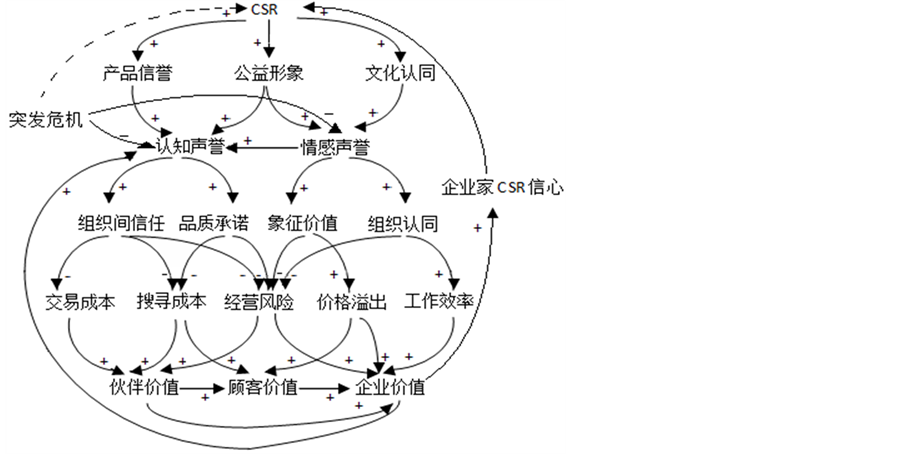1. 文献回顾与问题提出
1.1. 企业社会责任与经济绩效
企业社会责任(Corporate Social Responsibility,简称CSR),最初被定义为“商人有义务按照社会所期望的目标和价值,来制定政策、进行决策或采取某些行动”[1] 。著名的“责任铁律”的提出者Davis强调,“商人的社会责任必须与他们的社会权力相称”,并将企业的社会责任定义为“商人的决策与行动应该出于至少超出企业的直接经济利益和技术兴趣的目的,涉及到对社会经济和社会人类的双重义务” [2] 。
企业作为社会的细胞,从事着产品或服务的生产及销售活动,在通过交易赚取利润的同时,也承担着为社会整体创造福利的责任。如今的企业家不再单纯地将社会责任活动当做成本的消耗,企业也在寻找社会责任与经济绩效的完美结合,以便维持企业的可持续发展。企业改善其社会责任绩效的意愿由制度、道德、经济三个因素共同驱动,其中,经济动因是最根本的内在动因[3] 。那么,企业的社会责任活动与经济绩效的关系究竟如何?Griffin和Mahon (1997)对1972年到1997年间有关社会责任与财务绩效的51篇实证研究进行分析后发现,证明二者之间存在积极关系的有33篇,消极关系的有19篇,没有关系的有9篇[4] 。McWilliams & Siegel (2000)认为,因为存在着某些方法论问题,从相关研究中提炼任何让人们信服的假设时都应相当谨慎[5] 。由于以往研究对于企业社会责任对经济绩效的直接影响并不确定,自20世纪90年代以来,学术界开始转向关注利益相关者对于企业社会责任活动的认知和评价。例如,企业的社会责任活动能够吸引高素质的员工,增加顾客的满意度和顾客信任等。Klein和Dawar (2004)在研究产品危机情境下企业社会责任对消费者归因的评价时发现,企业社会责任的不良表现会影响消费者的品牌评价和购买意愿[6] ;Segerson和Miceli (1998)的研究发现,如果企业能够主动地承担相应的社会责任,走在政府出台规制之前,可以降低更为严格的立法威胁[7] 。这些松散而零碎的研究大部分都支持企业社会责任能够推进经济绩效,但是其内在机理——即企业社会责任活动是如何实现价值创造的问题并未得到回答,因此,本研究尝试在实证检验的基础上归纳出企业社会责任价值创造的系统动力机制。
1.2. 企业社会责任与声誉资本
企业声誉(corporate reputation)是指随着时间的流逝,利益相关者基于直接经验对企业做出的全面评价,涉及企业行为与其他主要竞争对手进行比较的信息和其他形式的沟通和符号。企业声誉领域的先驱Fombrun (与Van Riel,1997)在《企业声誉评论(corporate reputation review)》的创刊号上追溯了企业声誉的理论渊源,认为声誉研究涉及到经济学(主要是博弈论和信息经济学)、战略管理(含部分产业组织学的内容)、营销学(主要是品牌策略)、组织学、社会学(主要是社会识别过程)和会计学六个学科。良好的企业声誉能够为企业创造超额利润,它能使消费者感觉企业的产品质量优良,愿意为此付出溢价;吸引高素质的雇员;吸引投资人,增加资本市场的价值等。美国的Kevin T. Jackson在其Building Reputation Capital一书中,(中文译名为“声誉管理”,新华出版社)一书中,首次提出了“声誉资本”这一新概念1,包括真诚、信任、尊严、同情和尊重等,来源于公司的诚信经营和公平交易,在实际的商业关系中成为决定性因素,将对公司声誉的研究提升到了战略层次。
声誉的形成与很多因素有关,其中最重要的就是企业的社会责任行为,它既是企业形成声誉的源泉,也是企业声誉的重要组成部分,二者好像一个硬币的两面,不可分割[8] 。同样的,企业声誉也是与企业社会责任相关的最重要的概念之一,有些实证研究甚至直接用声誉指数替代社会责任表现,可见二者关系的密切程度。在企业声誉领域的研究中,已有实证研究表明CSR对企业声誉评价具有正面影响[9] [10] ,一些研究表明,企业社会责任活动与企业的社会形象相联系,并通过消费者对企业形象的联想影响消费者对企业的产品和服务的评价[11] 。企业社会责任与企业声誉紧密相连,它通过为企业建立良好的社会声誉,积极的口碑,进而对消费者态度产生影响。因此,本文的第二个问题在于探究声誉资本在企业社会责任对消费者态度与行为影响中的作用。
1.3. 企业社会责任的消费者响应
1999年,Carroll将企业社会责任理论框架的研究历程分为三个演进的阶段,分别为:企业社会责任和企业社会响应框架(Corporate Social Responsibility-CSR1,Corporate Social Responsiveness-CSR2)——企业社会表现(绩效)框架(Corporate Social Performance-CSP)——利益相关者框架(stakeholder)2。利益相关者理论使企业社会责任的研究明确了对象、具体内容和范围,并提供了测量企业社会责任的科学方法,使企业社会责任研究和企业战略管理之间架设了一座桥梁,将企业社会责任从利他的层次重新进行了定位,使其具有了与组织目标联系在一起的战略功能,如增加利润、增加声誉或商标等无形资产等,使企业利润最大化可以与企业社会责任和谐共存。
企业社会责任的消费者响应作为这一研究领域的重要分支,已经演变成近年来的主流研究趋势。大部分研究都将CSR与企业能力相联系,探究CSR通过影响消费者的企业评价进而影响消费者的购买意愿问题,但CSR对消费者企业评价的积极影响是否能延伸到消费者的行为层面,西方学者在现有研究中的阐述十分谨慎[12] 。我国学者对消费者CSR反应机制的实证研究还处于起步阶段,在少量的实证研究中,关注企业社会责任活动与企业能力对消费者产品评价的影响居多,还有一些研究加入了消费者个人特征等调节变量。但是共性的问题就是:研究一般只关注了消费者态度或者行为的某一方面结果,而没有将情绪、认知与行为意向连成一条价值链条;中介变量的选择往往依据研究偏好展开,如品牌资产、企业评价等,而未将揭示内在机理作为主要的研究目标;将社会责任活动作为研究的起点,而忽视了前置变量的影响效应。
2. 概念模型构建与假设提出
根据对相关文献的回顾,结合定性访谈的资料,本文提出了消费者视角研究的概念模型(如图1所示),以及相关假设,将前置变量、中介变量和消费者的情绪、认知以及行为意向建立在一个整合框架中展开研究。
2.1. 企业社会责任感知的影响因素——前置变量
2.1.1. 消费者介入度
消费者介入度(involvement)指的是一个对象或行为与消费者个人相关的程度[13] 。一般而言,消费者对某些产品和服务的购买决策感兴趣的程度越高,介入度越高;反之,则越低。高介入度往往意味着更高的风险,需要了解更多的相关信息,对购买决策付出更多的心力,低介入度则正好相反。金钱、时间、购买决策的复杂程度和购买中需要付出的努力等,共同决定了消费者的介入程度。Grohs (2004)等曾指出,消费者对善因活动的介入度越高,其对赞助品牌名称及其所属产品类别的知晓度就越高,熟悉的品牌令人感到安全、可靠,使人产生好感,因此消费者对其喜欢程度通常也越高,选购的可能性也越大[14] 。Berens等(2005)的研究认为介入度水平对消费者形成产品评价有影响,在企业能力和企业社会责任对产品评价的影响中,消费者介入度均起调节作用[15] 。据此提出本文的假设1:
H1:消费者的介入度越高,其对企业社会责任活动的感知评价越高。
2.1.2. 企业核心业务与社会责任活动的匹配度
营销领域对匹配关系的探讨最初见于品牌延伸、广告代言和商业赞助等领域,Aaker和Keller (1990)的研究发现,当延伸品牌与核心品牌有很好的联系时,二者之间的匹配和适应性会提高消费者对延伸品牌的评价[16] ;Park等(1996)的研究发现当两种品牌在属性互补方面高度匹配时,更有助于品牌联盟的成功[17] 。而后,关于赞助的相关研究强调了赞助商与事件之间匹配的重要性,这种匹配是指企业的形象、定位及目标市场与公益事业形象及受众之间在认知上的联系,即一些正面形象从一个对象(名人、新品牌等)向与该对象关联的品牌转移,与本文的研究主题非常接近。有研究成果表明,品牌与公益事项匹配程度可以充分地放大善因营销的效应[18] 。因此,当企业与其社会责任行为的关联度越高,即匹配度越高,消费者更容易对其社会责任活动的效果产生积极联想,这种积极的联想会带来公众认同,使消费者对社会责任活动产生更好的感知效果。据此提出本文的假设2:
H2:企业核心业务与社会责任活动的匹配度越高,消费者对企业社会责任活动的感知评价越高。
2.2. 企业社会责任感知对消费者情感认知及行为意向的影响
企业的不道德行为对社会产生一定程度的危害,一些消费者会通过惩罚企业的行为来实现其道德优越感和归属感。而另一些消费者基于功利主义原则和合同主义原则,也会对不道德的商业行为做出负面

Figure 1. The conceptual models of this paper/study
图1. 本研究的概念模型
响应(包括低购买意愿,负面口碑甚至消费者示威) [19] ,道义论者更是对企业没有承担相应义务产生很强程度的反感。相反,企业的道德行为则会受到消费者积极的响应。Handelman和Arnold (1999)研究发现,企业社会责任(参与家庭、社区和国家活动)对商店支持具有显著的正向影响[20] 。积极地履行社会责任可以增加企业顾客满意和顾客信任,影响消费者对企业的评价和购买意愿,Auger (2003)的研究发现消费者愿意为以道德方式生产的产品支付更高的价格[21] 。因此,良好的企业社会责任活动能够产生“晕轮效应”,可以影响顾客对产品或服务形成积极的评价,影响顾客的产品感知质量和购买意向。据此提出本文的假设3和假设4:
H3:企业社会责任感知对消费者的情感认知存在正向影响,即消费者对企业社会责任活动的感知评价越高,其对企业的喜爱和认知偏好越高;
H
3a
:企业社会责任感知对消费者的情感偏好存在正向影响;
H3b:企业社会责任感知对消费者的认知偏好存在正向影响;
H4:企业社会责任感知对消费者的行为意向存在正向影响,即消费者对企业社会责任活动的感知评价越高,其对企业产品的购买行为意向越强烈;
H4a:企业社会责任感知对消费者的购买意愿存在正向影响;
H4b:企业社会责任感知对消费者的支付溢价存在正向影响;
H4c:企业社会责任感知对消费者的口碑存在正向影响。
2.3. 声誉资本的中介效应
在营销学和经济学的许多文献中,企业声誉被视为市场信号。消费者可以通过企业声誉推测产品质量、解释公司当前行为[22] 。它承载着消费者的期望,并影响其购买决策。Sen和Bhattacharya (2001)通过操控一家真实企业的社会责任信息,发现企业社会责任行为通过直接和间接两种方式影响消费者的购买意愿,即存在溢出效益或者光环效应,间接影响通过消费者-企业认同作为中介变量作用于购买意愿[23] 。从消费者群体的利益需要和社会期望角度出发,Chen (2001)对制造业的企业声誉进行了实证研究,得出影响消费者角度的企业声誉影响因素分别是功能性产品属性、非功能性产品属性、企业能力和企业社会责任。还有研究基于消费者的社会期望角度,对制造业和金融保险业进行实证研究,最后抽取出社会表现和商业表现两个评价因子[24] 。Saxton (1998)认为对于消费者来说,市场领导力、产品质量、服务质量、品牌形象、管理和财务表现、社会表现是企业声誉的影响因素,并在多个行业进行实证检验[25] 。因此可以推断,企业社会责任不仅直接影响消费者态度,而且还可以通过声誉资本这一中介变量产生影响,据此提出本文的假设5、6:
H5:企业声誉资本中介了企业社会责任感知对消费者情感认知的作用,即企业社会责任在一定程度上通过影响企业声誉而影响消费者的情感认知,企业社会责任评价越高,企业声誉越好,其对企业的喜爱和认知偏好越高;
H
5a
:企业声誉资本中介了企业社会责任感知对消费者的情感偏好;
H5b:企业声誉资本中介了企业社会责任感知对消费者的认知偏好;
H6:企业声誉资本中介了企业社会责任感知对消费者行为意向的作用,即企业社会责任在一定程度上通过影响企业声誉而影响消费者的行为意向,企业社会责任评价越高,企业声誉越好,其对企业产品的购买行为意向越强烈;
H
6a
:企业声誉资本中介了企业社会责任感知对消费者的购买意愿;
H6b:企业声誉资本中介了企业社会责任感知对消费者的支付溢价;
H6c:企业声誉资本中介了企业社会责任感知对消费者的口碑。
2.4. 消费者情感认知与行为意向的关系
消费者态度包括认知情感因素,也包括行为倾向(意动)的持久系统,从态度形成的过程来看,认知(cognition)-情感(affect)-意动(conation)完整的构成了态度系统[26] ,见图1在这一系统中,认知影响情感,情感影响行为意向。Schmitt(1999)认为,如果企业能够在顾客心中唤起持续的积极情感,就可以培养出持久的顾客忠诚[27] 。也有研究证实消费者的情感反应对消费者的口碑行为具有直接的影响[28] 。据此,本文提出假设7:
H7:消费者积极的情感认知对其行为意向具有正向影响。
3. 研究设计
本文采用实验法推断企业社会责任行为对消费者态度的影响效应。与其他调研方法相比,实验法可以使研究人员在测量自变量或多个因变量的影响之前对这些变量进行操纵,作为推断因果关系是否存在的依据非常有效,对实验变量和外来变动控制得越好,研究就越能证明确立了正确的因果关系[29] 。
3.1. 实验设计
在本研究中,我们采用情景试验的形式。所有受访者都将首先阅读一个情境,然后就其对于该情境中产品的介入度、感知匹配度、企业社会责任感知评价、企业声誉资本以及消费者的认知情感和行为倾向等变量判断给出自己的打分。相比较让受访者自己陈述过去的一种情境的方法(即让受访者自己回忆过去的一项企业社会责任活动),因为消费者可能对之前的一些企业社会活动记得不很清晰,这样的方法可以避免记忆产生的偏差[30] [31] 。实验选择了慈善责任和环保责任进行场景设计,根据Carroll企业社会责任类型的界定,经济责任和法律责任是企业存在的基础,若不能履行企业将不复存在,因此本研究选择了伦理责任中的环境保护责任和自由裁量责任中的慈善捐赠进行研究。
试验采取2 (高介入度、低介入度) × 2 (高匹配度、低匹配度) × 2 (慈善责任、环保责任)的组间设计,情境设计如表1和表2所示。
3.2. 样本选择与数据收集
鉴于数据收集的成本和易得性,以及以往很多关于企业社会责任的研究都采用了学生样本,且这些研究结果与非学生样本的结果一致[31] ,本研究也采用了学生样本,样本主要来自于吉林财经大学的在校学生。这些被试被随机分配到8个组中。问卷共发放240份,回收208份,其中有效问卷160份,有效问卷回收率为66.67%。样本的男生性别比例为36.3%,女生性别比例为63.7%。
3.3. 变量的测量
研究运用被广泛应用于描述组织形象或品牌形象的研究中的语义差别尺度进行评价,采用双级尺度,中点表示中立立场,共分7度。尺度两端是一些极端的形容词或短语,每个问题从最左侧到最右侧的数

Table 1. The scene design to test philanthropy responsibility
表1. 慈善责任试验场景设计

Table 2. The scene design to test environmental protection responsibility
表2. 环保责任试验场景设计
字为1~7,最左侧倾向于评价最差,最右侧倾向于评价最好(如从非常差到非常好)。
本文研究所涉及的变量测量均来自于前人研究或公认采纳较多的量表。采用Vaughn (1986)测量消费者介入度的成熟量表,用决策的重要性、风险和思考程度三个问题来测量消费者对于购买某种产品的介入程度;社会责任活动与企业核心业务匹配度量表借鉴了Lafferty (2007)关于善因营销中匹配的相关研究,用兼容性、价值性和可信度三个问题来反映;企业社会活动的感知评价借鉴了BERENS (2007)和Lafferty (2007)的研究,用四个问题来测量;企业声誉分为情感声誉和认知声誉两部分,共12个问项来评价(刘靓,2005);消费者的认知和情感采用了6个问题来测量(周文辉、杨晋,2008),行为意向采用购买意向、支付溢价和口碑三个维度6个问题来反映(Lafferty,2007;Zeithaml,1996;蒋玉石,2007)。
4. 数据分析
研究首先对数据进行了信度和效度检测,检测结果符合要求后,进行相关假设的检验。本研究主要采用SPSS17.0作为数据分析工具,同时采用LISEREL和AMOS作为部分检验的补充,以验证本文的相关假设。
4.1. 信度和效度分析
研究分别采用SPSS17.0和AMOS17.0对数据进行了信度和效度检验。统计结果显示,每个变量及其分维度的Cronbach’s α系数都在0.7~0.9之间,达到了Cronbach’s α系数最好高于0.7的标准,内部一致性良好,详见表3。
本文研究中各变量的测量项目建立在国内外学者的研究成果的基础上,能够保障量表的内容效度。首先用AMOS运算出各个指标变量观测量的因子载荷,然后运行组合信度执行程序计算出平方差提取量(即AVE),结果显示介入度AVE为0.5198,组合信度0.7598。AVE可以直接显示被潜在变量所解释的方差有多少是来自测量误差,AVE越大,指标变量被潜在变量解释的方差百分比越大,相对的测量误差就越小,一般的判断标准为大于0.5。介入度、匹配度、CSR感知、声誉资本、情感认知、行为意向AVE值都大于0.5,说明聚合效度较好。最后计算出两两因子之间的相关系数值,并分别与各因子的AVE值平方根比较,结果显示,相关系数都小于各自的AVE值平方根,说明区别效度较好(如表4所示)。
4.2. 模型检验
4.2.1. 前置变量的假设检验
研究分别检验慈善责任和环保责任背景下,消费者的介入度和企业核心业务与社会责任活动的匹配度对企业社会责任影响效应的作用。使用方差分析的数据分析方法检验相关假设,在F值达到要求,显著性水平P小于0.05的水平下进行检验,可以发现消费者的介入度和企业核心业务与社会责任活动的匹配度对慈善责任和环保责任都有显著影响(如表5所示),而且消费者的介入度越高,其对企业社会责任活动的感知评价越高,企业核心业务与社会责任活动的匹配度越高,消费者对企业社会责任活动的感知评价越高,假设1、假设2得到验证。
4.2.2. 企业社会责任对消费者态度与行为意向的影响
为了验证企业社会责任对消费者态度与行为意向的影响效应,研究使用方差分析的数据分析方法分别对慈善责任和环保责任的数据进行了分析,在显著性水平P小于0.05的水平下进行检验,H3、H4均通过了验证,即企业社会责任感知对消费者态度与行为意向存在显著的正向影响(如表6所示)。由此可见,企业社会责任感知对消费者的情感认知存在正向影响,即消费者对企业社会责任活动的感知评价越高,其对企业的喜爱和认知偏好越高;同时,企业社会责任感知还对消费者的行为意向存在正向影响,即消费者对企业社会责任活动的感知评价越高,其对企业产品的购买行为意向越强烈。
消费者积极的情感认知对其行为意向还具有显著的正向影响,慈善责任和环保责任F观测均值分别为4.081和3.978,P值均为0,H7通过验证。
4.2.3. 企业声誉的中介效应
研究采用温忠麟提出的中介效应检验程序,本文将以假设H5a为例详细说明检验过程。第一步,将自变量(企业社会责任感知X)、中介变量(企业声誉资本M)、因变量(情感偏好Y)对应的量表项目得分合并取均值并中心化;第二步,检验方程y = cx + e1中的c是否显著,结果显示方程Y = 0.191X + 1.322回归效应显著,t = 2.12, Sig. = 0.001,c显著;第三步,检验方程M = aX + e2 ,Y = c'X + bM + e3中a,b是否显著,结果显示方程M = 0.144X + 0.917回归效应显著,a的t = 2.211,Sig. = 0.012,a显著,方程Y = 0.006X + 0.323M + 0.834回归效应显著,b的t = 3.1,Sig. = 0,显著;第四步,由于a、b都显著,因此

Table 3. Reliability test on the scale
表3. 量表信度检验

Table 4. Validity test on the scale
表4. 量表效度检验

Table 5. The results of hypothesis test on the impact of antecedent variables on corporate social
表5. 前置变量对企业社会责任影响的假设检验结果

Table 6. The results of hypothesis test on the impact of corporate social responsibility on consumers’ attitude and behavior intention
表6. 企业社会责任对消费者态度与行为意向影响的假设检验结果
进一步检验系数c’,在第三步中我们得到c’的t = 0.002,Sig. = 0.199,c’不显著,因此可以认为完全中介效应显著。具体检验结果如表7所示。
4.3. 结论:管理启示
企业社会责任的研究近年来引起了学术界和实践界的普遍关注,尤其是对于企业社会责任能否在履

Table 7. The results of the test on mediating effect of corporate reputation
表7. 企业声誉的中介效应检验结果
行义务的同时为企业创造超额价值,这种价值创造的机理如何,是理论研究领域亟待解决的问题。许多研究者从不同角度对该问题展开了研究,基于消费者领域的研究是其中一个重要的研究视角。由于企业价值的最终创造需要消费者的购买来实现,所以消费者对待企业社会责任的态度以及由此引发的行为意向的研究对于揭示企业社会责任的价值创造过程具有重要意义。本文采用实验的研究方法,通过操纵慈善责任和环保责任两种类型的企业社会责任活动,来推断企业社会责任活动对消费者态度和行为之间是否存在因果关系,并引入了企业声誉作为中介变量,验证相关假设。
4.3.1. 企业的社会责任行为对消费者的态度和行为意向具有正向影响
数据分析的结果显示,企业的社会责任行为能够影响消费者的态度和行为意向。企业的社会责任联想对于消费者的态度,无论是情感偏好还是认知偏好都呈现出显著的正向影响。由于企业积极实践了社会责任活动,基于这种认知使得消费者更加喜爱该企业。认知和情感对意动又有连带作用,因此消费者对企业社会责任活动的感知评价越高,其对企业产品的购买行为意向越强烈,这些意动体现为购买意愿、支付溢价和口碑宣传三个方面。由此可见,企业的社会责任行为对消费者具有重要影响,因而积极的社会责任行为能够增强企业的经济绩效。
4.3.2. 企业声誉在企业社会责任对消费者的态度和行为意向的影响中具有中介效应
本研究表明,企业声誉在企业社会责任对消费者的态度和行为意向的影响中起到了中介作用,即企业社会责任活动除了可以直接影响消费者的态度和行为意向外,还可以间接的通过影响企业声誉对消费者的态度和行为产生影响。但是,这种中介作用的程度并不完全一样,声誉资本在CSR感知对消费者情感偏好的影响中起到完全中介的作用,即消费者对CSR活动的情感偏好一定是建立在声誉资本感知的基础上的;但是其对认知偏好则只有部分中介作用,说明消费者对CSR活动的认知偏好部分建立在声誉资本感知的基础上。对于CSR对消费者的行为意向,声誉资本在其对购买意愿和支付溢价上显著中介;而在口碑上则显示出部分中介的影响效应。
4.3.3. 消费者的介入度和企业核心业务与社会责任活动的匹配度对企业社会责任影响效应发挥着重要作用
根据本研究所进行的情景设置和数据的分析检验可以发现,企业社会责任活动的影响效应还受到一些外部因素的影响,如消费者的介入度和企业核心业务与社会责任活动的匹配度。消费者介入度水平越高,对于企业社会责任活动越了解,对其情感认知和行为意向影响越显著;同样的,核心业务与社会责任活动的匹配度越高,其企业能力与社会责任的互动越好,对消费者的情感认知和行为意向的影响越显著。因此,企业在设计社会责任活动时,要综合考虑该活动能够引发的消费者的介入度水平和匹配度感知,要善于组织那些能够引发消费者共鸣的,同时又对企业能力有充分展示的社会责任活动,将其正的外部效应充分发挥出来。
5. 基于实验的企业社会责任价值创造理论构建
企业社会责任理论是伴随着争议产生的,早期的论争围绕着企业是否应该承担社会责任的问题展开,介入其中的既有著名的法学家、社会学家,也有经济学家和法学家。有影响力的论争主要有两次,分别是20世纪30年代至50年代哈佛大学法学教授多德(Dodd)与哥伦比亚大学法学教授伯利(Berle)的责任范围之争,和20世纪60年代伯利(Berle)与曼尼(Manne)关于现代企业作用的论战3。争议的两派始终将企业的责任观与经济观旗帜鲜明的对立起来,造成了实践界对于履行社会责任的消极态度和被动行为。企业履行社会责任被认为是一种成本的消耗,主要是由于社会责任活动会降低企业的效率和收益、造成竞争者之间的成本差异,因此古典经济学理论并不主张由企业来解决社会问题,而应该由自由市场体系里不受约束的活动来解决。自由市场不能解决的,应该由政府和立法来处理。因此,企业履行社会责任的最大阻力便来自于其对成本的消耗带来的价值损失。为了给企业家进行社会责任实践提供具有说服力的理由,实证研究很早就开始了证明企业社会责任能够为企业带来价值的假设,但是结论并不一致,缺乏理论基础的实证数据无法真正解决社会责任与经济绩效的关系问题。本研究基于实验研究的数据结论,跟据Senge (2006)提出的系统动力学和系统思考范式,构建了声誉资本驱动企业社会责任价值创造的系统动力模型,尝试从理论上解决企业社会责任进行价值创造的机理问题。
5.1. 声誉资本的成本补偿机制
企业积极履行社会责任,必然付出更高额的成本代价,这种代价会使企业的短期利润受损,因而企业在实践中对于履行社会责任并不积极;履行社会责任短期来看似乎意味着成本的增加,但是通过前文的实证研究我们可以发现,消费者愿意为企业履行社会责任多付出的成本支付溢价,对于积极履行社会责任的企业,消费者不仅在认知情感上(喜爱和满意)对企业呈现出积极的态度(假设3通过检验),同时也乐于在行为上(购买意向、支付溢价和口碑)支持企业的社会责任决策(假设4通过检验)。这种响应通过企业声誉中介产生(假设5和6通过检验),恰恰实现了企业责任观和经济观的统一。因此我们可以推断,积极履行社会责任却能为企业带来声誉的提高和无形资产的增加,良好的企业声誉能够为企业吸引高质量的利益相关者,从而改善企业的价值网络,实现长期价值的增值。因此,企业履行社会责任所付出的成本代价可以通过声誉资本的价值创造来补偿。
5.2. 声誉资本驱动的企业社会责任价值创造机理
企业的社会责任行为并不能直接为其所支付的成本进行补偿,而是通过声誉资本的价值增值作用来进行,因此,企业社会责任的价值创造过程也是间接通过声誉资本进行驱动完成的。企业社会责任活动能够为企业带来许多无形的收益,如企业树立的公益形象、有保障的产品或服务质量、基于强烈责任观的企业文化对外部利益相关者的影响等,这些无形影响均体现为企业声誉资产价值的提升;CSR活动通过对企业情感声誉和认知声誉的提升,进而影响利益相关者对企业的评价及合作意向,声誉的提升使企业与合作伙伴之间的信任增强,对企业的产品品质提供了背书性承诺,同时赋予了企业品牌或产品品牌更高的象征价值,也提高了企业内部员工对组织的认同;合作伙伴的组织间信任降低了交易成本、搜寻成本和企业风险,对产品品质承诺的提高也能够降低搜寻成本和企业风险,象征价值的提升则能够在降低企业风险的同时提高价格溢价,员工内部的组织认同能够直接提高员工的工作效率,进而降低企业的经营风险;交易成本、搜寻成本和企业风险的降低增加了企业的伙伴价值,价格溢出的增加和搜寻成本、企业风险的降低则增加了企业的顾客价值;工作效率、价格溢出的提高以及企业风险的降低共同决定了企业价值的提升;伙伴价值和顾客价值最终也体现为企业价值的提高;企业价值的提高能够影响企业家的社会责任信心,进而促使企业确立更加明确的社会责任战略,并在社会责任活动中进行更多的投入,其系统动力机理如图2所示。
在企业正常运营中,声誉资本驱动企业社会责任进行价值创造的过程实现了一个良性循环。而当企业遭遇某些突发性的危机时,企业社会责任的巨大作用可以使脆弱的声誉资本在面临威胁或损害时得到缓冲或补偿,促使企业尽快摆脱危机,进入正常的价值循环。当企业由于管理不善或经营疏漏导致了突发性危机时,企业的声誉资本将遭到巨大的损害,这种损害往往会使企业努力多年营造的良好形象毁于一旦。因此对于企业经营者而言,要竭力避免发生这类危机,其带来的后果是企业的利益相关者对企业的信任出现动摇,企业的经营风险增加,价值受损。为了弥补这些恶劣影响,企业需要持续的社会责任投入(如图2虚线部分表示突发性危机对于企业社会责任投入的间接刺激),来聚焦公众视线,并重新使利益相关方对企业树立信心。如此方能平衡掉突发危机对声誉资本的巨大损害,因此为了增强声誉资本的缓冲力,企业应该未雨绸缪,持续进行社会责任投入,以降低经营风险。
5.3. 责任观与经济观相统一的企业社会责任理论框架
基于以上实证结论和理论分析,本文提出基于声誉资本的企业社会责任理论新框架,将企业的责任观与经济观统一起来,形成良性循环(图3所示)。从企业的责任观出发,当企业确立了社会责任战略后,

Figure 2. Power/Dynamic system of corporate social responsibility and value creation driven by reputation captial
图2. 声誉资本驱动企业社会责任价值创造的动力系统

Figure 3. The mechanism medol based on corporate social responsibility and value creation driven by reputation captial
图3. 基于声誉资本驱动的企业社会责任行为与价值创造的机理模型
需要设计实际的社会责任活动来实践,活动设计与核心业务以及企业形象的匹配程度影响目标受众对企业社会责任活动的感知(假设2通过检验);此外,受众对企业社会责任行动的介入程度也影响企业社会责任的感知(假设1通过检验)。企业的责任观影响着众多的利益相关者,这些利益相关者既包括企业内部的员工和股东(灰色区域),也包括企业外部的顾客、供应商、竞争者、合作伙伴,以及更外围的政府、非政府组织和社区。这些利益相关者通过企业的社会责任活动获得了不同程度的受益,因而对企业声誉将会产生正向的积极的评价,企业的初始声誉存量便在这一过程中得到了增值,形成了新的声誉存量,即完成了声誉资本化的过程。其结果便是对企业的经济观产生深远影响,高水平的企业声誉决定了高质量的合作伙伴,提升了企业的伙伴价值;同时吸引了高价值的顾客,提升了顾客价值;也对企业内部的员工和股东产生影响,提升了企业价值,这三种价值又具有交互影响,共同确立了企业的经济观。因而,企业的责任观和经济观得到了统一,责任观通过作用于利益相关者从而提升了声誉资本,进而正向促进了企业经济绩效的实现;而经济实力的增强则促使企业将更多的收益投入到社会责任活动中,从而实现长期的、可持续的增值循环链条中。
这一框架有助于企业重新认识社会责任的成本补偿机制,为企业主动积极履行社会责任提供了理论依托与实证依据。但是文章仅从消费者视角进行了实验设计和实证检验,所以存在着一定的局限性,对其他利益相关者的影响效应和实证检验还有待继续进行,以完备这一新框架的理论验证。
基金项目
国家自然科学基金课题《基于差别优势的隔离机制:非契约性竞合效应研究》(71372066);国家社科基金青年项目《消费者不安全感的形成机理与应对机制研究》(14CGL072)。
NOTES
1战略学者Fombrun等(2000)提出了“声誉资产”的说法,认为企业的声誉是无形资产,竞争对手难以模仿、获得或用其他元素替代,因此形成流动性壁垒,使声誉拥有者能够获得持续竞争优势。从含义上来看,“资本(capital)”一般是指可以带来价值的投入,是价值概念,关注剩余;而“资产(equity)”则是存量概念,是预期能给企业带来经济利益的资源。本研究旨在揭示社会责任的价值创造问题,因此“声誉资本”这个概念更加合适。而由此演化出来的“声誉机制”则是指由于声誉具有价值创造的功能,因而经营者为了保护和创造声誉会产生诸多经营行为,这种行为的动力机制即为“声誉机制”。
2这三个阶段出自Carroll (1999)的Corporate Social Responsibility一文,之后的研究者一般都遵循着三阶段的划分方式。
3伯利和多德主要探讨了管理者的受托责任问题,即管理者究竟对谁负责,其责任的范围如何界定。1931年,伯利在《哈佛商业评论》上发表了题为《作为信托权利的公司权利》一文,引发了这场争论的开端。他提出“所有赋予公司或者公司管理者的权力,无论是基于公司的地位还是公司的章程,或者同时基于这两者,只要有股东利益存在,这种权力在任何时候都必须只用于全体股东的利益。因此,当行使权力会损害股东利益时,就应该限制这种权力”。多德则表示出不同的看法,他在第二年的《哈佛商业评论》上发表了题为《公司管理者是谁的受托人》一文,提出了“公司作为一个经济组织,在创造利润的同时也有服务社会的功能”。表面看来,这场讨论是在法律层面进行的,但其实质却围绕着现代公司及其管理者在社会中的作用展开。随着讨论的不断深入,伯利逐渐认同了多德提出的公司负有社会责任的观点,而多德也改变了自己的初衷,转而接受伯利的观点,认为涉及到的法律上的困难是显而易见的。1962年,曼尼针对伯利后期公司应该负有社会责任的理论,在《哥伦比亚法学评论》上发表了题为《对现代公司的“激烈批判”》一文,探讨了现代公司的政治地位,以及公司在社会感兴趣的各种价值观的分配和使用中应该起到的作用,他认为“如果公司要在一个高度竞争的市场上出售产品,他就不可能从事大量的非利润最大化的活动,如果他一定要这样做,那么很可能无法生存”。对此,伯利立即进行了回应,认为最初由亚当·斯密提出的古典自由市场理论已经不再适用于现代公司,在美国,私立工业既受到全国性经济计划的影响,又受到针对某些行业的特定计划的控制。伯利与曼尼的这场争论的核心是以古典自由市场理论为基础的传统企业理论与现代企业理论之争,二者的基本立场截然相反,最终也无法达成共识。